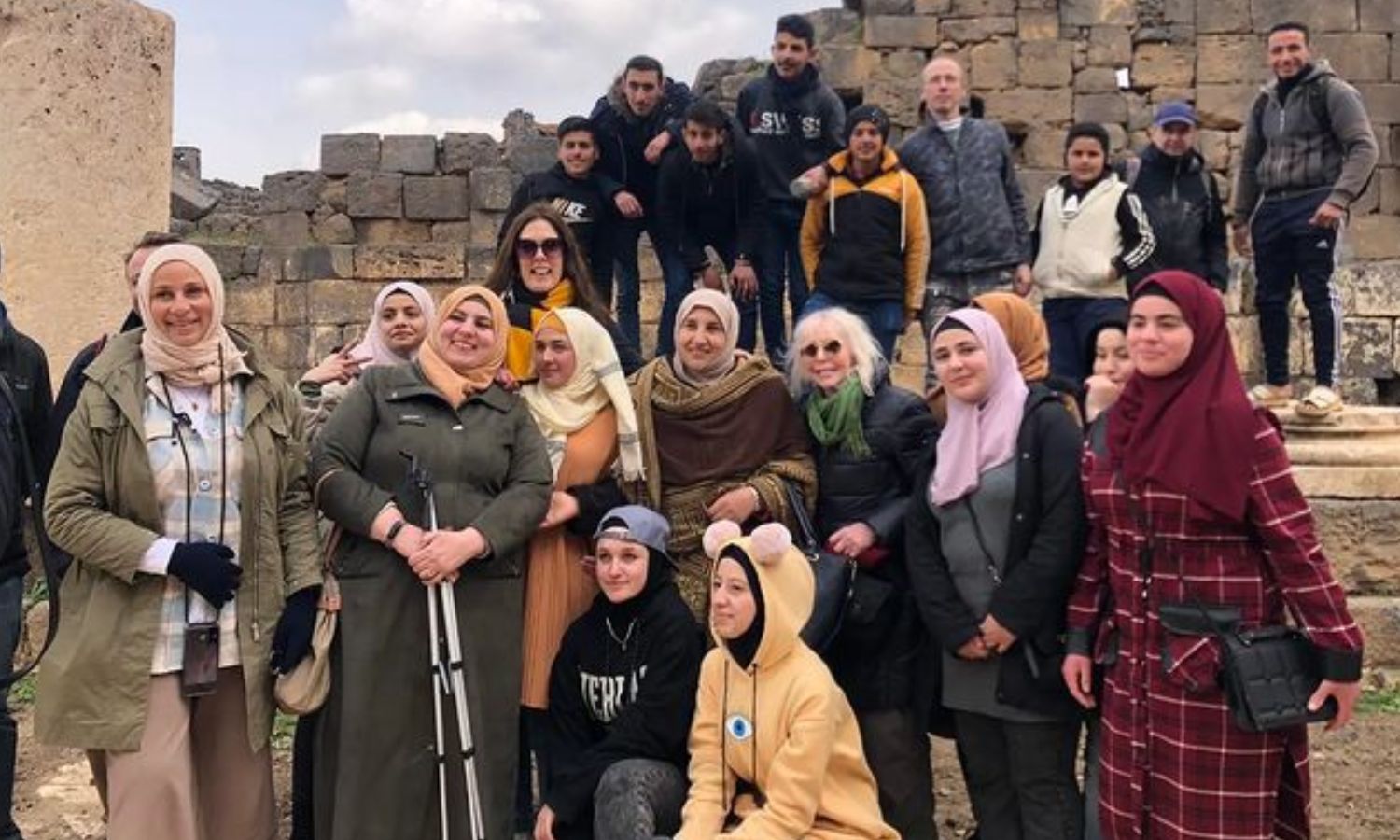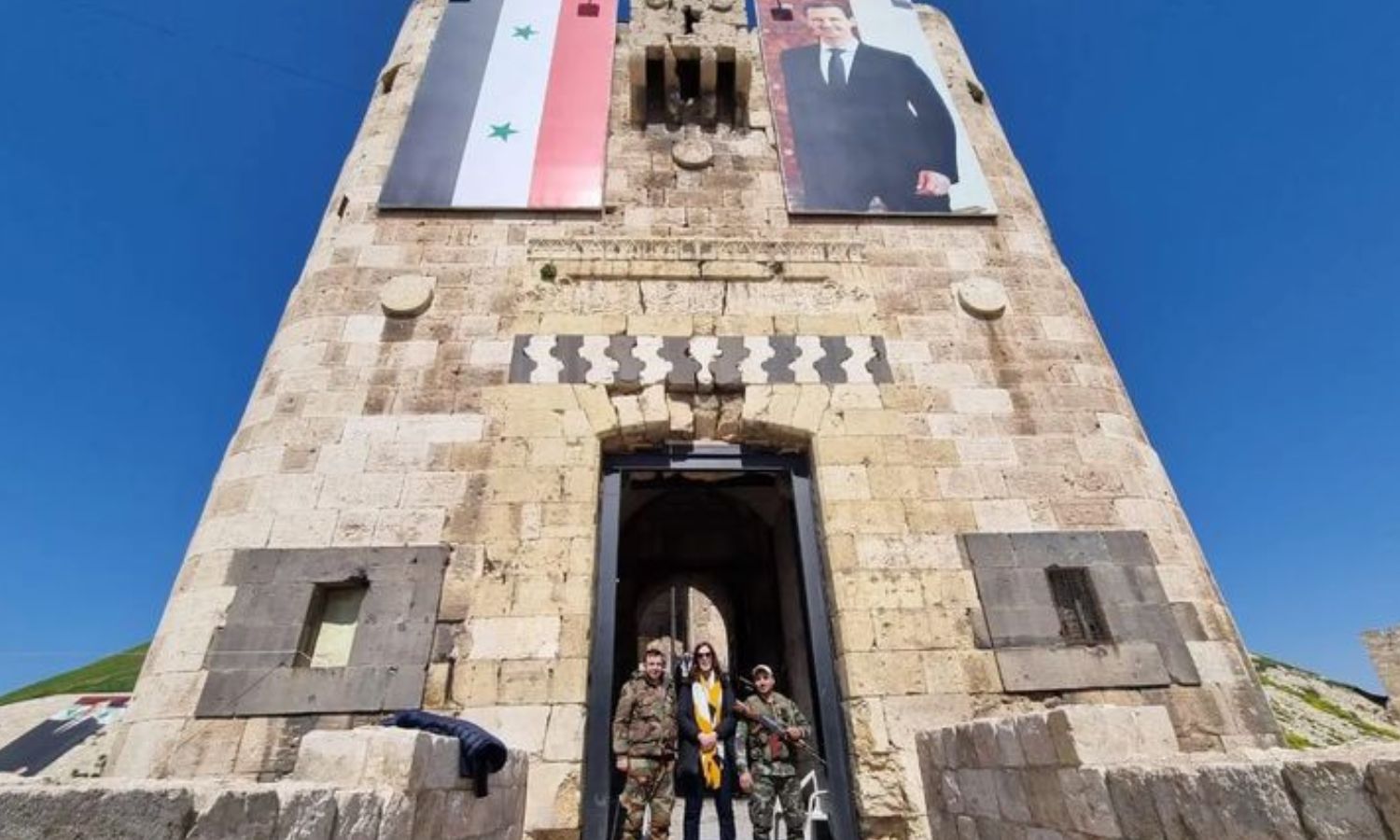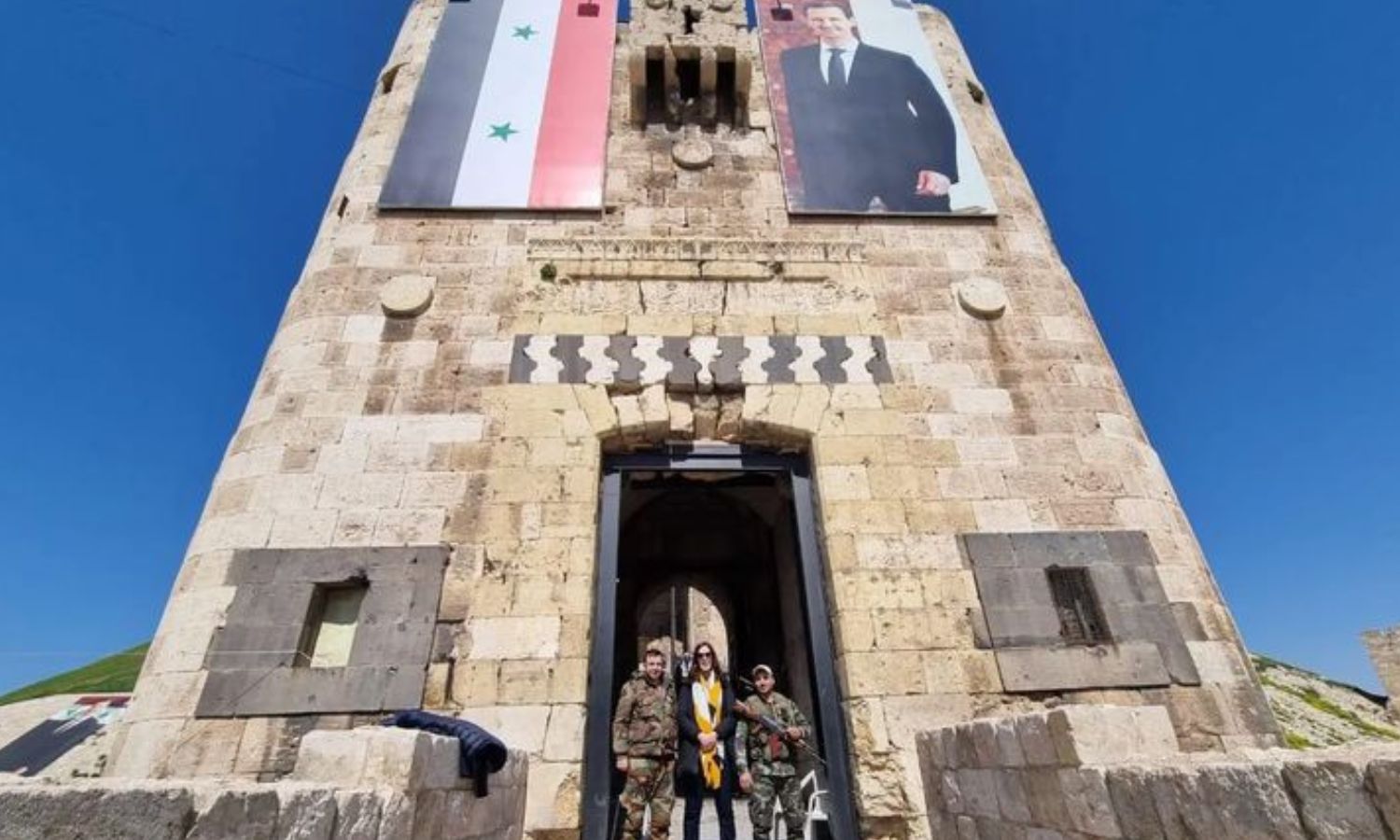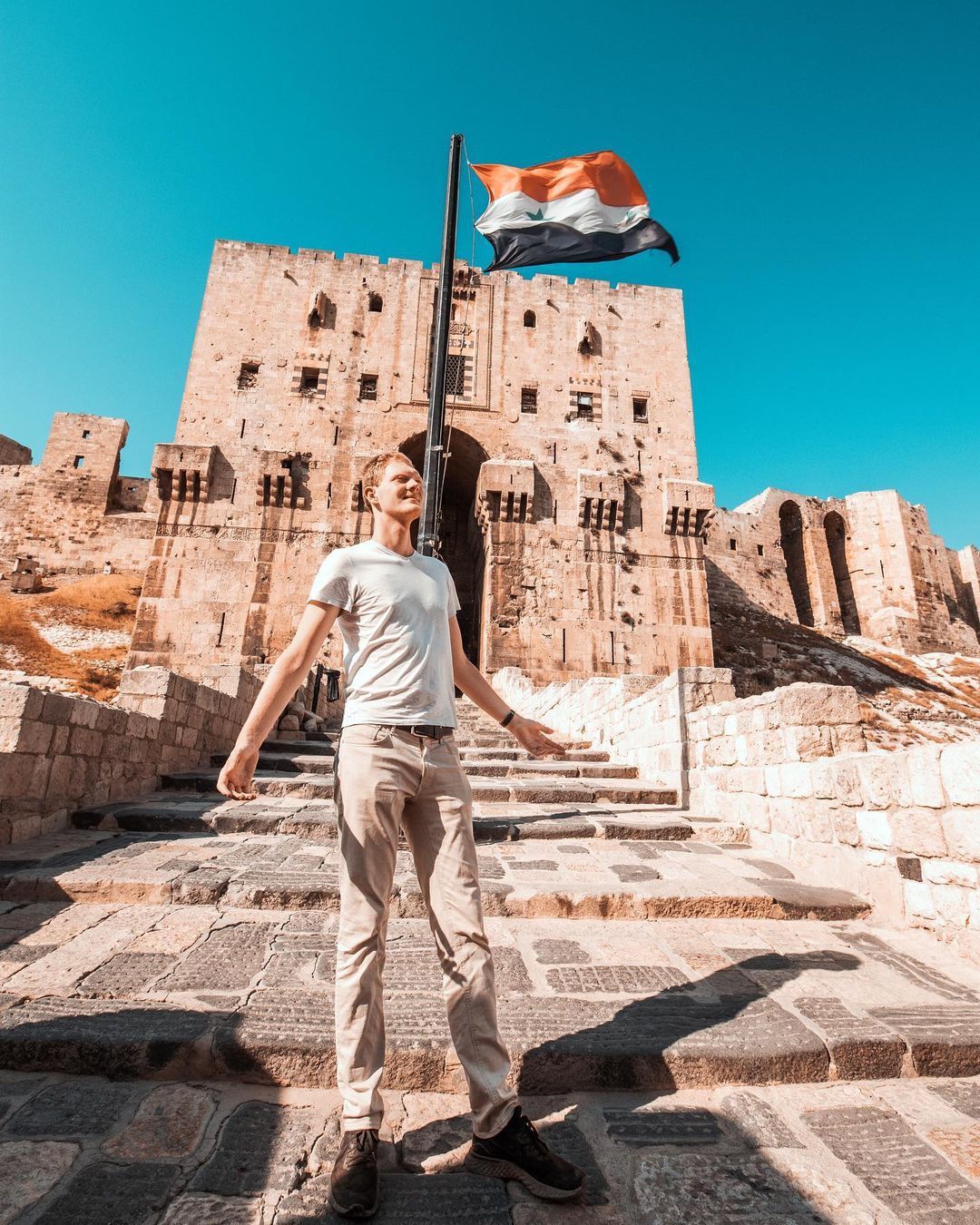Jana al-Issa | Hussam al-Mahmoud | Muhammed Fansa
Since regaining control over large areas of Syria, the Syrian regime has launched a promotional campaign to attract tourists and has devoted its attention to the tourism sector by supporting investors and offering various facilities to those wishing to promote an image of a “Safe Syria” that the regime desired to export.
As it is one of the most prominent sectors that provides funds to the state treasury, the regime’s government has supported in recent years the establishment of luxury tourism projects such as hotels, resorts, and others, without paying attention to the need of Syrians residing in areas under its control for various basic services, or supporting sectors that improve their living conditions, such as industry, crafts, etc.
However, the government’s interest did not meet its ambition amid a global reputation that “Syria is unsafe,” a reputation that temptations could not underestimate.
In this file, Enab Baladi discusses the reasons for the regime’s government promotion of the return of the tourism sector, its support for improving its situation, and the results of this concern, depending on the government-released numbers of tourists.
Enab Baladi is also attempting to measure the impact of social media influencers’ promotion of tourism in Syria on the reality of tourism amidst the lack of life necessities for its residents.
Promotion and interest to obtain funds
Prior to 2011, Syria’s tourism sector was among the fastest-growing economic sectors and one of the most prominent pillars on which the state treasury is based in terms of revenue. The number of foreign visitors was at its highest back in 2010, reaching some 9.45 million visitors that entered Syria. The sector was then the second largest source of foreign currency after oil exports.
In 2010, the sector generated foreign exchange earnings of about 3.9 billion USD. Revenue from Syria’s tourism sector was estimated at 8.21 billion USD (about 386 billion SYP, depending on the exchange rate of the dollar against the Syrian pound at the time), equivalent to 13.7% of the country’s Gross Domestic Product (GDP).
After losing most of its treasury revenues, the regime has been seeking for years to revive this sector through promotion, a method it also simultaneously adopts to float itself politically.
The government’s apparent interest in the return of tourism, and its neglect of improving the functioning of other sectors, such as the industrial or artisanal sector, has made it subject to repeated criticism. The latest criticisms were published in the state-run al-Baath newspaper, coinciding with a two-day “tourism investment” forum held by the regime government in Damascus in mid-October 2022 with the official presence and participation of a number of businesses, businessmen, and Arab and foreign investors. During this conference, more than 70 tourism-related investment projects were presented.
At the time, the newspaper criticized the regime’s government’s tendency to support the tourism sector and consider it a priority, in addition to pumping and expanding tourism projects, while vital installations are being closed and the production in others is pending fuels and energy.
During its coverage of the forum, the newspaper reported that “at a time when the throats of industrialists, investors, and artisans (…) were sore, demanding their most basic rights, we found unprecedented comfort in our meeting with investors during the Tourism Investment Forum. Most of them recalled the rapid response to their demands and the facilitation of importing the required equipment for their five-star facilities”.
Money first
The expert in Syrian political economic affairs, Pr. Salam Saeed told Enab Baladi that the regime’s government’s primary aim behind promoting tourism in Syria is to raise tourism revenues in order to supplement its treasury with funds.
Saeed explained that the state’s foreign exchange revenues usually come from two key resources, the first being exports, while the second is through the service sector, such as tourism, banks, and others.
Considering that Syria’s banking sector needs much development to ensure revenue through it, the regime resorts to the easiest fund-collecting option, according to Saeed.
The regime does not spare any opportunity for political empowerment, exploiting the tourism sector as leverage for its repositioning and passing its “Safe Syria” messages through social media influencers in their different languages and methods upon their visits to Syria.
Inconsiderate to Syrians
The regime’s government promotes tourism and works to improve the sector while residents in regime-held areas live in extreme poverty, where basic services such as electricity, water, and others are absent, amid an annihilated purchasing power for citizens. This is a “disconnection” from the reality of Syrians, according to Pr. Salam Saeed; despite extreme poverty, the regime’s government was supporting the establishment of extravagant leisure venues, targeting people from a certain class of society, she said.
Saeed considered that the Syrians frequenting these venues belong exclusively to a certain class in the country; they are wealthy warlords who are on Western sanctions lists, consequently unable to travel outside the country because of it.
Meanwhile, actual foreign tourists may be Russian nationals, for example, considering that European tourists are not interested in visiting Syria for a variety of reasons, including the instability and the reality of political isolation imposed on the regime, according to Pr. Saeed.
The economist, Amer Shahda, said in an interview with al-Baath newspaper in October 2022 that the focus today should be placed on finding solutions to the economic and social situation, while tourism is “just a detail.”
Shahda added that, despite the importance of the tourism sector and its achievement of resources, creation of job opportunities, and economic benefits, there are priorities and determinants of the success of the tourism forum, the most important of which is the stability of citizens by addressing their economic problems. Collective stability encourages tourism, while securing a place of residence for a foreigner in the absence of housing for the displaced persons who lost their homes is “a fantasy and mere propaganda,” as he put it.

A tourist group in front of an archaeological site in Syria – 14 July 2022 (Young Pioneer Tours/Instagram)
Ambition-undermining reality
The regime’s attempts to support the tourism sector, translated on the ground by various decisions, activities, and projects with a view to attracting tourists, collided with adverse factors, resulting in disappointing results that have not achieved the desired tourist season. Recent years have seen the outbreak of the coronavirus pandemic (COVID-19), which has disrupted movement and travel worldwide, and partially limited it to the necessary minimum. In addition, numerous countries have suspended flights to other countries that do not demonstrate an encouraging health situation with the spread of the virus.
The regime’s movements in this sector were also met with appeals and invitations to tourists launched by concerned organizations with the aim of not supporting the regime’s endeavors through this sector.
“Encouraging plan”
Following the conclusion of the Tourism Investment Forum held on 16 and 17 October 2022 under the auspices of the regime’s government and in cooperation with the Ministry of Tourism and the Investment Agency in the presence of the Minister of Tourism, Mohammad Rami Martini, new investment and tourism projects were revealed, including two tourism and hotel investment companies that were approved by the Ministry of Internal Trade and Consumer Protection, according to the local Athr Press website. In addition, the Dama Rose company was established under the ownership of the Ministry of Tourism under many justifications that ultimately serve tourism investment.
Likewise, the al-Asayel al-Malakiya company, which is owned by three Syrian businessmen, and two tourist facilities for which the Prime Minister, Hussein Arnous, has laid the foundation of in the Syrian capital, were included in what was announced with the aim of boosting tourism.
On 15 November 2022, the Minister of Tourism called for a reduction in the prices of overnight stays in the ministry’s hotels by up to 50% to increase occupancy and stimulate tourism.
In accordance with what was then reported in the state-run newspaper Tishreen, the minister called for reducing prices from that date until the holidays and beyond, as it is the period when expatriates come to celebrate with their families. The minister also viewed his decision as a motivational message for the private sector to take similar steps and make encouraging offers to stimulate domestic tourism.
Below expectations
“Good, but below expectations,” this is how the Minister of Tourism, Mohammad Rami Martini, described on 13 October 2022, the tourist season, after expectations that it would be an “unprecedented” season. He explained that the number of tourists for the year 2022 was over a million without clarifying the concept, according to which the ministry classifies those coming to Syria as tourists.
From early 2022 until July, the number of foreign tourists and Arabs visiting regime-controlled areas reached 727,000, including 629,000 Arabs and 98,000 foreigners, according to the Directorate of Planning and International Cooperation in the Ministry of Tourism. However, no less than 70% of the tourists in those areas are Lebanese and Iraqi nationals, specifically in the years 2019 and 2020, in which tourism practically halved due to the coronavirus outbreak.
Even though Lebanese and Iraqi nationals enter Syria on tourist visas, this does not mean that the purpose of the visit is indeed tourism or that their expected spending would be as if they were tourists.
This statistic was followed by figures mentioned by the Director of Tourism in Damascus, Majed Ezz El-Din, to the state-run al-Baath newspaper in mid-December 2022, stating that the number of foreign tourists coming to Syria in 2022 reached 176,000 people, 20,000 of whom are American nationals, while the majority was Arab nationals with more than 1.5 million people.
Difference in destinations
The last decade has relatively changed the concept of tourism in Syria because of the difficulty of separating it from a new set of economic, security, and political factors that imposed themselves on the ground, and it has become difficult to move separately from it at an internal or external level. If pre-revolution tourism meant visiting historical monuments, archaeological castles, and remnants of past civilizations, leaving material evidence of them, then the new reality and Syria’s flashy presence in global news bulletins during periods of military escalation attracted some “YouTubers” and content creators to visit the heated areas, either for the purpose of showing off and creating a “trend” or to convey an incomplete image of normal life in Syria, one that even Syrians are unable to behold.
Neighborhoods that were turned into ruins by the regime’s bombing, and cities that were once on fire and subjected to devastating military operations, constituted a delicious meal for content creators, which the regime’s government sought to exploit and harness to serve it. The deputy minister of tourism in the regime’s government, Ghiath al-Farrah, considered that the YouTubers’ promotion of tourism in Syria during their visits, which take place in coordination with the tourism agencies and the federation of tourism chambers in the ministry, serves as a substitute for participating in tourism exhibitions.
Political economist Ayman al-Dusouki regarded the regime’s promotion of tourism as an attempt to market what he regards as a “victory over terrorism,” relying on content creators and marketing for tourism of another kind, “Dark Tourism,” referring to visiting dangerous and ravaged places.
He added that the security and service conditions in Syria do not constitute an attractive environment for foreign tourists in general, in addition to the existing service crises, most notably the shortage of fuels and the electricity supply instability.
As for religious tourism, a large proportion of those coming under this category are Shiite visitors, possibly because of the fact that it is a cover for Iranian militias to move to Syria.
Speaking to Enab Baladi, al-Dusouki pointed out what he considered the regime’s manipulation of the statistics of tourists and the classification of Syrians who visit their country during the holidays under this category to promote tourism. He also noted that those close to the regime benefited from the sector through luxury restaurants and hotels, such as Hussam Qaterji in Aleppo and Luna al-Shibl in Damascus.
A report by The Guardian in November 2019 dealt with what it described as “Dark Tourism” in Syria, which focuses on visiting dangerous destinations and locations of war and destruction. Many tangible data can undermine the credibility of any talk of normal life in Syria, based on Syria’s occupation of the last ranks in international statistics related to press freedoms, the level of safety and transparency, the basics of life, and the level of freedom of speech.
The current fuel crisis has also caused a partial disruption of daily life in regime-held areas, in addition to “rationing” electricity at most hours of the day.
In June 2022, the Director of Detainees’ Affairs at the Syrian Emergency Task Force, Omar Alshogre, called on tourists during a Security Council meeting not to visit Syria so as not to indirectly support the Syrian regime’s economy, what he considered to be a contribution to financing the regime’s war on civilians.
What does the “tourist” think?
Enab Baladi surveyed the opinions of a group of Syrians, each residing in a different country, and asked about their position or the extent to which they could visit Syria for the purpose of tourism, and concluded the following results:
Abdullah, 31, an expatriate in the UAE, said that tourism requires a comfortable place, but Syria has no electricity or amenities, and prices are not much different from prices in any city in the world.
He added that what might motivate any Syrian to visit his country is to meet the family, which itself does not encourage the idea of a son coming in the country’s current circumstances.
Ahmed, 30, based in the Netherlands, considers that it is inhumane to visit a place where the blood of his children has not yet dried up, and they may be buried under the rubble near the tourist himself, according to his description.
From an economic point of view, Ahmed does not like to spend any amount for the purpose of tourism and enjoyment in a place whose people live below the poverty line and without services.
The Russia-based Yazan, 30, has a different opinion, as it is likely that he will visit Syria for tourism, given that his family resides in areas controlled by the regime.
He points out that there are many tourist areas without denying that prices do not constitute an attraction factor, as the young man talked about spending one night in a resort in Tartus in 2021, costing him 200 USD.
At the same time, he doubted the possibility that Syria would constitute an attractive destination for foreign tourists, given that simply typing the name of Syria in the search box via Google in Arabic or English is sufficient to show discouraging results, including images of war, destruction of infrastructure and tragedy.
As for Iyad, 35, who resides in Turkey, he confirmed that the security reality in Syria does not encourage tourism, and from an economic point of view, the prices are no different from any other country, and therefore there are absolutely no motives for tourism in Syria.
YouTubers’ promotions are not attractive
The country’s reputation not encouraging
The Syrian regime has taken advantage of some influencers on various social media outlets, such as YouTubers, in recent years in order to attract Arab and foreign tourists. However, the country’s reputation, burdened with violations and tragedies and human rights criticism of content creators, have restrained some of them without leaving an adequate impact on the sector.
The Deputy Minister of Tourism, Ghiath al-Farrah, considered that the arrival of YouTubers to Syria promotes tourism in the country “in a big way” when they share clips during their visits to places in Syria on the YouTube platform.
The content creators’ visits are carried out in coordination with the tourism offices and the Federation of Chambers of Tourism in the ministry, he added.
The titles of the video clips provided by “Youtubers” and “Vloggers” about Syria vary, showing the “safe country” and “low prices” and what it contains of social experiences, tours of ancient monuments, and Syrian food, without addressing the places that were bombed by the regime or talking about what contradicts the regime’s version of the “war on Syria.”
A report by the Washington Post on 23 June 2022, titled “Amid criticism, Western tourists returning to a battered Syria,” indicated an escalation of criticism by human rights organizations and Syrian refugees against companies specialized in organizing tourist trips to Syria, especially after 2019, when “Western tourism” rebounded slightly, and the subsequent videos and blogs by travel influencers.
Justifications, the “lethal” collective propaganda
Enab Baladi contacted a tour company called “Saiga Tours”, which secures travel visas for people wishing to come to Syria.
The company said, through an e-mail correspondence with Enab Baladi, about its organization of tourist travel to Syria, that the visitors do not mainly support the Syrian economy but rather bring in some money for the residents who own shops and simple trades, such as popular hotels.
A report issued by the Syrian Justice and Accountability Center (SJAC) in July 2021 said that tourism can help some local residents in Syria, but mass promotion without understanding the reality of things is irresponsible at best and may be “fatal” for many of those who still live every day with violence, poverty, and oppression.
Mohammad al-Abdallah, executive director of the SJAC, told Enab Baladi that the effect of “YouTubers” videos on attracting tourists is “very limited.” He considered that the videos spread through them are “not innocent” and that they are from “not neutral” people. Indeed, most of them have anti-Western or pro-Russian political leanings.
Al-Abdallah believes that the country’s reputation limits the impact of the propaganda videos, as Syria has become known in the West as a country witnessing a “critical war,” the spread of terrorism, and the kidnapping of foreign tourists.
He added that even if some tourists come to visit Syria, the tourism situation will not return to what it was before 2011.
On 28 November 2022, The Guardian published a report titled “Whoever says Syria’s safe is a liar’: country’s tourist drive at odds with human rights record.”
“The government has begun a concerted campaign to convince investors – and holidaymakers – that Syria has much to offer foreign visitors,” the veteran newspapers said.
“Whether tourists will want to holiday in a country where thousands of civilians have been killed in the past decade, and the risk of regional violence is high remains to be seen,” the report added.
“The vloggers are going to Syria because you need to do something different to stand out,” Sophie Fullerton, a disinformation researcher, told The Guardian.
Fullerton says that the increase in travel to Syria raises questions about the ethics of making travel content. “People should be able to travel where they want, but you need to engage in ethical travel, and you need to be mindful of what has happened there,” she says. “The people who come and rewrite the last ten years of history do a disservice to the Syrians who can’t go back.”
Tourism in Syria to where?
The Syrian Justice and Accountability Center’s report recommended doing more to discourage “adventurous tourists,” who encourage spending money that ultimately supports the regime.
According to the center, tourism should only be encouraged after reaching a just peace agreement and after ensuring the dignified return of hundreds of thousands of Syrians who have been forcibly displaced, as encouraging tourism serves to legitimize a regime that is involved in systematic human rights violations.
Al-Abdallah indicated that tourism will not return to what it was before 2011, as any tourist will not spend his money in a country where he may be exposed to danger.
“Tourism is part of the fun and getting to know other countries, but the country’s widespread reputation prevents it from attracting tourists,” he added.
Al-Abdallah compared tourism in Syria with Egypt, where cases of attacks on ordinary tourists or “YouTubers” were recorded, which amounted to the death of an Italian student under torture in a government police station, which led to the “abortion” of tourism in the country.
Although Egypt is considered better than Syria in terms of security and services, and in comparison with the number of tourist attractions, the country’s security reputation affected the tourism situation there.
In view of Syria, which is divided into four authoritarian regions and several destroyed provinces, the tourist will be restricted to visiting a few places only, according to al-Abdallah.
The human rights activist believes that the future of tourism appears bleak and that this sector is not relied upon economically or in the media to export the regime’s narrative.
For his part, economic researcher Ayman al-Dusouki told Enab Baladi that we are talking about a tourism sector that is burdened with the burdens and repercussions of the Syrian crisis.
He added that despite the regime’s efforts to revive it, its recovery actually depends on several factors, the most important of which is political stability.
Security stability is also one of those factors to prevent the outbreak of military actions or local protests, to protect the security of tourists, in addition to the rehabilitation of damaged infrastructure, and the required government investments, in addition to attracting foreign investments.
According to the researcher, by reading these factors together, it becomes clear that they have not been achieved, and this means the continued faltering of the tourism sector and preventing the restoration of its numbers and economic contribution that were registered before 2011.
In a report published in October 2021, the government newspaper, al-Wehda, spoke of estimates by the Ministry of Tourism of losses in the tourism sector since the beginning of the war, which amounted to about 330 billion Syrian pounds.
The newspaper quoted the Director of Planning at the Ministry of Tourism, Qassem Darwish, as saying that the ministry’s estimates indicate that a significant rise in this sector will not take place before 2030.
if you think the article contain wrong information or you have additional details Send Correction
النسخة العربية من المقال
-
Follow us :
Most viewed
- Turkey moves to deploy air defense system in Syria
- Daraa mobilizes against Israel... Civilian casualties
- SDF to withdraw from Aleppo neighborhoods following agreement with Damascus
- Washington's conditions raise questions about its openness and goals in Syria
- Western perspective on Syria: Focusing on foreign jihadists













 A customer of a foreign tour company in front of the entrance to the Citadel of Aleppo - 14 July 2022 (Young Pioneer Tours/Instagram)
A customer of a foreign tour company in front of the entrance to the Citadel of Aleppo - 14 July 2022 (Young Pioneer Tours/Instagram)





 A
A
A
A
A
A











 More In-Depth
More In-Depth